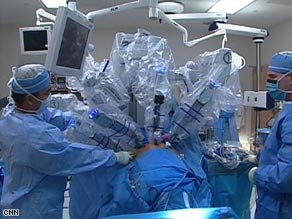CNN Medical Associate Producer
ATLANTA, Georgia (CNN) -- As 3D images illuminate the viewfinder, a joystick delicately maneuvers a pair of robotic arms. It may sound like a video game, but Dr. Nikhil Shah is actually performing cancer surgery.

Robotic surgery allows for smaller incisions, reduced blood loss and much greater precision by the surgeon.
In this case, the surgeon is removing a man's prostate gland. Roboticsurgery is a growing trend in treating prostate cancer. The number of cases have increased sevenfold in the past four years, from 10,000 in 2004 to a projected 70,000 in 2008, according to Intuitive Surgical Inc., the creators of the robotic device. The advantages of robotics -- fewer side effects and quicker recovery times in many patients -- have led to increased use for other surgeries, including hysterectomy, kidney cancer and some heart procedures.
"At first, men think we hook up a robot and then go get some coffee, but the reality is the robot arms are a tool that I control, just like a scalpel, " said Shah, who has performed more than 600 robotic prostatectomies at St. Joseph Hospital in Atlanta, Georgia.
One benefit Shah describes is precision that far exceeds the human hand. The robot-controlled scalpel works delicately around the nerves and blood vessels in the pelvic area, vastly reducing the risk of damage that can lead to incontinence or impotence. "I'm able to spare all the things that help men have their dignity and at the same time take away the cancer," he said.
Studies have shown some benefits of robotically performed prostatectomy over a traditional open prostatectomy -- but the data aren't overwhelming. One clear advantage, Shah said, is the reduced blood loss. Also, robotic surgeries are considered minimally invasive. Instead of a 4½-inch incision, robotics patients have six dime-sized incisions in the abdomen. Some patients experience only minimal pain and are in the hospital less than 24 hours.
No comments:
Post a Comment